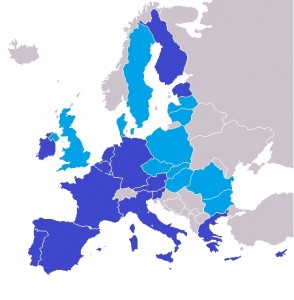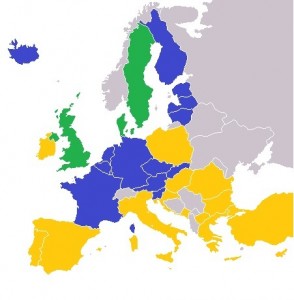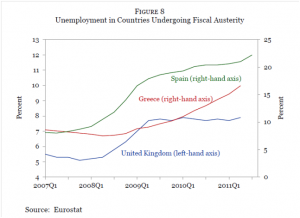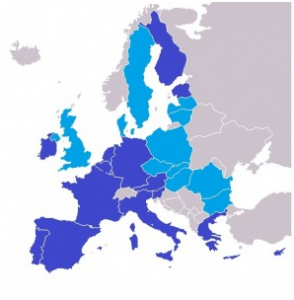 So it looks like markets are pricing the euro (dark blue) break-up (light blue being all other countries of the EU without the euro). The best proof is the spread of Austria over the German bund: this is not a default premium, since’s Austria public finances look in great shape even compared with the German ones: at the end of 2010, government debt amounted to 71.8% of gross domestic product (GDP) less than the German one, at around 80%.
So it looks like markets are pricing the euro (dark blue) break-up (light blue being all other countries of the EU without the euro). The best proof is the spread of Austria over the German bund: this is not a default premium, since’s Austria public finances look in great shape even compared with the German ones: at the end of 2010, government debt amounted to 71.8% of gross domestic product (GDP) less than the German one, at around 80%.
The spread between Austria and Germany, that during the Summer lingered around 0,5% is today at 1,5%. It touched 184 when “Austria’s cabinet signed off a draft law to cut its debt level to 60 percent of gross domestic product by 2020… The draft law, which is modeled on German regulation, aims for the structural deficit not to surpass 0.35 percent of GDP as of 2017, Chancellor Werner Faymann told reporters… In order to meet the debt-brake criteria, about 2 billion euros ($2.7 billion) of the structural deficit must be cut every year, Faymann said.”
So the introduction of this reform was worth only 30 basis points of the 100 structural pick-up. What is the remaining rise due to? The euro break-up obviously, which markets are pricing in mildly for Austria (since a new euro with Germany is very likely, although not certain, to include Austria) and more largely for others less “respectable” countries.
A break-up that cannot be avoided through laxer monetary policy or a centralized fiscal union, the currently proposed reforms discussed in the newspapers. Why? Simply because both policies, albeit very different in stance (the first expansionary, the second restrictive, God knows why, one might add) affect the area as a whole in the same way, while what the euro area needs right now is a policy that solves the root of the crisis, i.e. the growing imbalances of foreign current account between Germany & Co. (surplus) and Italy & Co (deficit) that are themselves due to the growing differential competitiveness between the two areas (good performance from Germany, bad for Italy).
What solutions? Either Germany expands its public demand like it did for East Germany twenty years ago or Italy deflates its wages Greece style. The first is unlikely because … Germans do hardly feel obliged to help countries like the Mediterranean ones (they already had some problems doing it with Eastern Germany at the time). The second is unlikely because Italy’s very likely social unrest would make it a daunting task for any politician to govern.
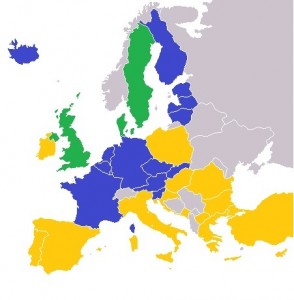 So how do we save Europe and the euro? Given the cultures at stake, so different that we cannot speak of one Europe yet, we take advantage of the existence of two Europes to create a second euro. Yes. Look at the new map. Actually, it has 3 euro, sorry.
So how do we save Europe and the euro? Given the cultures at stake, so different that we cannot speak of one Europe yet, we take advantage of the existence of two Europes to create a second euro. Yes. Look at the new map. Actually, it has 3 euro, sorry.
a) The green euro, the monarchic euro, of United Kingdom, Sweden and Denmark. They have done pretty well so far without the euro, let’s link them together in a strategic embrace with an ideal common currency. But they do not give up on the European Union, obviously, which so many things in terms of freedom of trade it created.
b) The blue euro. It is the euro of those countries that give priority to stability. It will appreciate immediately compared to the other currencies, including the yellow euro we are about to describe to you. Here are the countries that will adopt the blue euro: France, Germany, Holland, Belgium, Luxembourg, Austria, the Czeths and Slovaks. Plus Slovenia and why not Iceland, Finland, Estonia, Lithuania, Latvia. The Northern euro (don’t call it neuro, ok?).
c) As for the yellow euro, of the color of the sun of the Mediterranean sea. Those countries in search for growth. They will adopt, because of the higher focus on growth and thus inflation, a quickly depreciating currency. This will allow rapid export growth and a fading away of current account imbalances with the blu euro countries. Italy, Spain, Ireland, Portugal, Greece (sure!), Malta, Cyprus and here come also Poland, Hungary, Romania, Bulgaria, Croatia, and Macedonia and Montenegro too. Finally, last but not least (why not dream!) Turkey too. This Turkey entrance will reverse the speed of accession to the European Union of a strategic partner that so stupidly we have left behind.
Notice that, as a by-product of this reform, many Eastern European countries that are skeptical about joining the euro today will find it easier to enter in a more gradual way in the yellow euro area. While we will wait for a process of cultural integration between blue and yellow countries more similar to the one that successfully unites the states of United States – common language, workers’ mobility, one only army – we will enjoy in the yellow euro countries a process of gentler and more natural integration based on cultural stronger and stronger ties (a must and a desired goal for those countries) and on an economic policy more focused in favor of growth and less against inflation.
The other monetary union, the blue one, will be anyway linked to the yellow euro countries by the single market of the European Union. It will in addition enjoy the possibility of strengthening its
capacity to reach its desired goal of monetary supremacy.
Together, both areas will dialogue so as to reach over time – possibly 20 years? – a common currency again. Those 20 years will be used to reinforce the cultural ties across these two geographical areas, a precondition for a successful single currency. They will be used for advancing
a sharing of tasks in foreign policy: while blue euro countries will dialogue with Russia and China, yellow countries will establish stronger ties with Africa and the Middle East. They will be used for the yellow euro countries to learn to fight better inflation and for blue euro countries to fight more for employment and growth. As a sign of commitment, both areas could decide to keep a blue-born as head of the Yellow Central Bank and a yellow-born as head of the Blue Central Bank.
We can do it. Let us ponder very carefully the alternatives. A fiscal union would lead the euro area as we know it today to disaster. 2 euros are certainly better than none.
